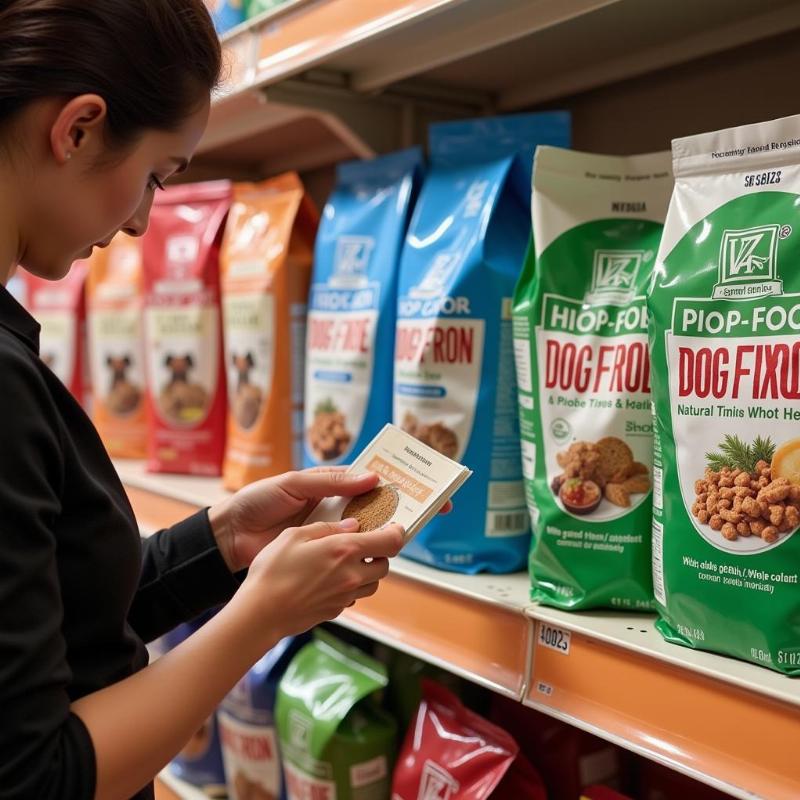Anal gland problems in dogs are a common and often unpleasant issue for pet owners. Finding the right dog food for anal gland issues can be a key factor in managing this problem and keeping your furry friend comfortable. This article explores the connection between diet and anal gland health, offering practical advice on choosing the best dog food for anal gland issues, alongside helpful tips for overall anal gland care.
How Diet Affects Anal Gland Health
A dog’s anal glands are small sacs located on either side of the anus. They secrete a foul-smelling fluid that normally empties during defecation. However, if the stool is not firm enough, the glands may not be fully expressed, leading to impaction and potential infection. Dietary fiber plays a crucial role in maintaining proper stool consistency. A diet lacking in fiber can result in soft stools, which fail to put enough pressure on the anal glands during bowel movements, preventing natural emptying. This is where choosing the right dog food for anal gland issues comes into play.
Choosing the Best Dog Food for Anal Gland Issues
 Selecting dog food for anal gland issues
Selecting dog food for anal gland issues
When searching for dog food to help with anal gland problems, look for brands that prioritize high fiber content. Ingredients like beet pulp, pumpkin, and sweet potato are excellent sources of fiber. Here are some key factors to consider:
- Fiber Content: Aim for a dog food with a minimum of 4% crude fiber.
- Quality Ingredients: Choose foods with whole grains, lean proteins, and digestible carbohydrates. Avoid fillers and artificial ingredients.
- Moisture Content: A higher moisture content in canned food can also contribute to softer stools. Consider dry kibble, which can promote firmer stools and better anal gland expression.
- Probiotics: Some dog foods include probiotics, which can improve gut health and contribute to healthy stool formation.
Beyond Dog Food: Other Tips for Anal Gland Health
While diet is crucial, other factors contribute to anal gland health.
- Weight Management: Obesity can exacerbate anal gland issues. Maintain a healthy weight for your dog through portion control and exercise.
- Veterinary Check-ups: Regular veterinary check-ups are essential for early detection and management of any anal gland problems.
- Professional Expression: If your dog is experiencing recurring anal gland issues, consult your veterinarian. They can safely express the glands and recommend appropriate treatment.
Can Supplements Help with Anal Gland Issues?
While choosing the best dog food for anal gland issues is paramount, some pet owners also consider supplements. best anal gland supplements for dogs can provide added fiber or support overall digestive health. However, always consult with your veterinarian before starting any new supplements.
Why is My Dog Licking His Butt?
Excessive butt licking can be a sign of impacted anal glands. Learn more about this behavior and its connection to anal glands in our article on my dog keep licking his butt.
What if My Dog Smells Like Rotten Eggs?
Sometimes, anal gland issues can lead to a foul odor. If dog smells like rotten eggs, it could be a sign of impacted or infected anal glands. Check out our article on why does my dog smell like rotten eggs for more information.
Is Tail Biting Related to Anal Gland Problems?
While tail biting can have various causes, it can sometimes be related to discomfort caused by anal gland issues. Explore the link between these behaviors in our article why does my dog keep biting her tail.
Conclusion
Addressing anal gland problems in dogs requires a multifaceted approach, with diet playing a significant role. Selecting the right dog food for anal gland issues, rich in fiber and quality ingredients, can contribute significantly to preventing impaction and promoting healthy digestion. Remember to consult your veterinarian for personalized advice and treatment options tailored to your dog’s specific needs.
FAQ
- What are the signs of impacted anal glands? Scooting, excessive licking, and a foul odor are common signs.
- How often should I express my dog’s anal glands? Only if recommended by a veterinarian. Frequent manual expression can disrupt the natural emptying process.
- Can I add fiber supplements to my dog’s food? Consult your veterinarian before adding any supplements.
- Is there a specific breed more prone to anal gland issues? Smaller breeds are often more susceptible.
- What if my dog’s anal glands are infected? Veterinary treatment is crucial for infected anal glands.
- Can diet alone resolve anal gland problems? While diet is essential, it may not be the sole solution. Other factors, like weight and exercise, also play a role.
- Are there any home remedies for anal gland issues? Consult your veterinarian before trying any home remedies.
Beautdogs.us is your premier online resource for comprehensive dog care information, breed-specific guidance, and access to top-quality products in the US. Whether you’re a seasoned dog owner or just starting your journey, Beautdogs.us is committed to providing you with reliable, engaging, and up-to-date information to ensure your furry friend’s well-being. Contact us today for expert advice and discover the perfect products and resources to enhance your dog’s life. Email: [email protected], Phone: +1 501-555-7529. Visit Beautdogs.us.